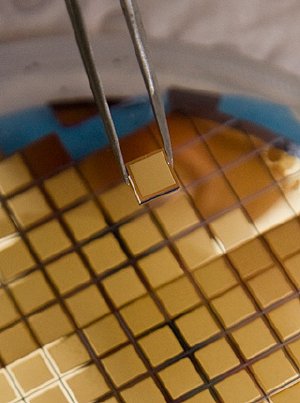Jul 13 2009
In response to the growing threat of swine flu, a UQ team is applying nanopatch technology to potentially solve the problems associated with vaccinating millions of Australians, thanks to a recently announced government grant.
 Nanopatches
Nanopatches
Australian Institute for Bioengineering and Nanotechnology (AIBN) researcher Professor Mark Kendall heads a team testing the potency of mass vaccinations using only a fraction of the standard dose.
The project also targets cross-protection by delivering the seasonal vaccine to protect against challenge from the swine A H1N1 influenza virus.
Professor Kendall said this research used new nanopatch technology which does away with the needle and syringe and stimulated a potent immune response with a reduced dose.
"By accurately and reliably delivering the vaccine to the abundant immune cells, which are located just under of the surface of the skin, we are able to initiate a rapid and powerful immune response from the body, while using considerably less vaccine," Professor Kendall said.
"The beauty of the nanopatch is that it could enable large-scale rapid vaccinations in a cost effective manner that is currently not available with the needle and syringe.
"The nanopatch could also potentially eliminate needle phobia and the risk of needle stick injuries while being easy and cost-effective to administer" he said.
The team includes researchers from the University of Melbourne, the Australian Animal Health lab and one of Professor Kendall's UQ collaborators, Professor Ian Frazer of UQ's Diamantina Institute for Cancer Immunology and Metabolic Medicine.
The project is supported under the fast-tracked National Health and Medical Research Council's H1N1 (swine flu) Medical Research Projects.